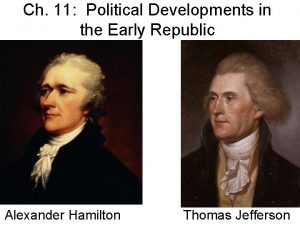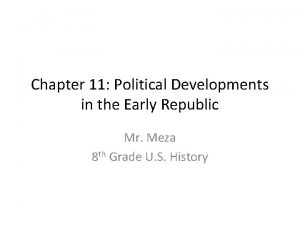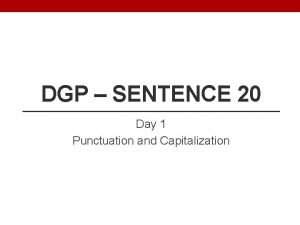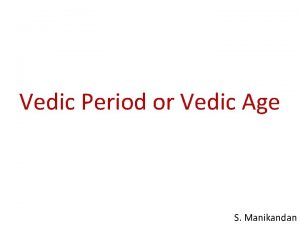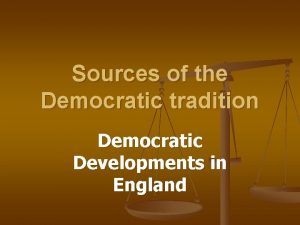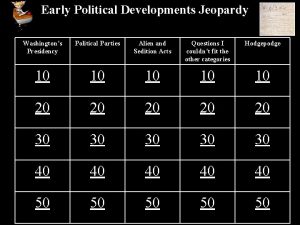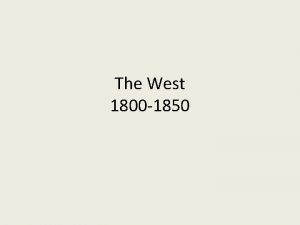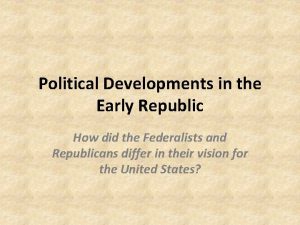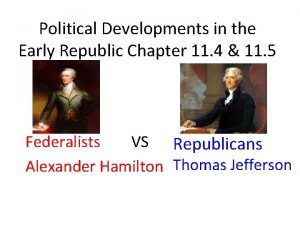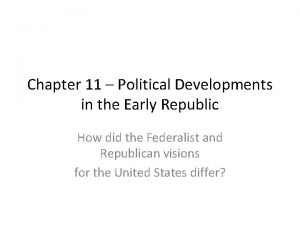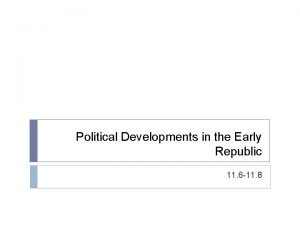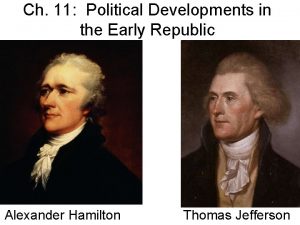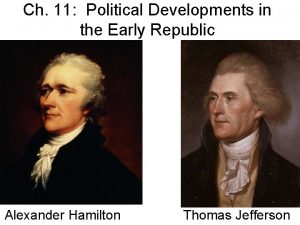Political Developments of the Early 1800 s Concert

















- Slides: 17

Political Developments of the Early 1800 s Concert of Europe to Revolutions of 1848


Concert of Europe • Lasted from Congress of Vienna in 1815 until the Crimean War of the 1850 s • Series of arrangements to enforce the status quo as defined by the Vienna settlement • 1. Highly conservative in nature • 2. Essentially a crusade against liberalism & nationalism • Two major provisions: Quadruple Alliance and the Congress System.

Quadruple Alliance • Russia, Prussia, Austria and England • Provided for concerted action against any threat to peace or balance of power. • France was usually seen as the possible violator of the Vienna settlement. • Alliance agreed that no Bonaparte should ever again govern France. • Austria used the alliance to defend the status quo as established at Vienna against any change or threat to the system. • Liberalism and nationalism were seen as threats to the existing order. 4

Congress System • European international relations controlled by series of meetings held by great powers to monitor and defend status quo • Principle of collective security required unanimity among members of the Quadruple Alliance • Worked effectively until the early 1820 s • 1822, Britain withdrew from the Congress effectively killing the Congress system. • Britain disagreed with the Congress’s squashing of a revolt in Spain 5

Holy Alliance • proposed by Alexander I in 1815 • Included Russia, Prussia and Austria • First attempt to stop the growth of liberalism • Proposed for all monarchs to sign a statement agreeing to uphold Christian principles of charity and peace • Plan proved to be overly ideological and impractical and few took it seriously (especially Britain) • Liberals saw it as a sort of unholy alliance of monarchies against liberty and progress. 6

7

Conservatism and Repression • Conservatism was a reaction to liberalism and a popular alternative for those frightened by the violence, terror and social disorder of the French Revolution. • Embodied most by Klemens von Metternich of Austria • Supported by traditional ruling classes (e. g. nobles) & peasants who still formed majority of the population • Bourgeoisie constituted the biggest threat to the conservative status quo • Believed in order, society and the state; faith and tradition • Edmund Burke: (1729 -1797): Reflections on the Revolution in France • One of the great intellectual defenses of European conservatism. • Defended inherited privileges, especially those of English monarchy and aristocracy. • Advised England to go slow in adapting its own liberties. 8

9

• Metternich was particularly concerned about the multi-ethnic character of the Hapsburg empire • Nationalism in particular threatened to tear the empire apart. • Repression by conservatives resulted in the period between 1815 and 1849. • Austria and the German Confederation • Multi-ethnic composition of Hapsburg Empire meant liberalism and nationalism were potentially more dangerous than in other countries. • Liberalism and nationalism were often centered in universities in first half of the 19 th century • Karlsbad Diet (1819) called by Metternich • Karlsbad Decrees cracked down on liberalism in universities and drove liberalism and nationalism underground. 10

• Prussian gov’t and its traditional ruling classes (Junkers) followed Metternich’s lead in repressing liberal and nationalist movements. • Britain • The conservative Tories (who had defeated Napoleon) controlled the government. • Corn Laws of 1815: halted importation of cheaper foreign grains. • Habeas corpus repealed for first time in English history • “Peterloo Massacre” of 1819 • Pro-liberal crowd listening to anti-Corn law rhetoric were attacked by police. • The press was brought under more firm control and mass meetings were abolished. 11

• Russia: • Czar Alexander I (1801 -1825) initially favored Enlightened despotism but after 1815 grew increasingly reactionary but his death lead to a power vacuum • Nicholas I became the tsar • Decembrist Uprising (1825) • Decembrists (junior military officers): upper-class opponents of the autocratic Russian system of gov’t • Supported popular grievances among Russian society. • First upper-class revolt against Russia’s autocratic system of government • Nicholas became Europe’s most reactionary monarch • Resulted in severe alienation of Russian intellectuals 12

13

• France began this period as the most liberal large state in continental Europe • Charter of 1814 established a constitutional monarchy under King Louis XVIII • “White Terror”: In 1815, thousands of former revolutionaries murdered by royalist mobs • Elections in 1816 restored moderate royalists to power 14

15

Liberalism • Characteristics • First major theory in Western thought that saw the individual as a self-sufficient being, whose freedom and well-being were the sole reasons for the existence of society. • Classical Liberalism • Reformist and political rather than revolutionary in character • Individuals entitled to seek their freedom in the face of tyranny. • Humans have certain “natural rights” and governments should protect them (Locke). • Rights are best guaranteed by a written constitution, with careful definition of the power of gov’t • Republican (representative) form of gov’t • Utilitarianism: founded by Jeremy Bentham • Utility of any proposed law or institution was based on “the greatest happiness of the greatest number. ” • Bentham was a major proponent of Poor Laws. 16

Impact of Liberalism • Influenced revolutions in France in 1830 and 1848 • Liberalism became embodied in over ten constitutions secured between 1815 and 1848 in the states of the German Confederation. • Influenced reform measures in Britain from the 1830 s into 20 th century. • Inspired German student organizations and impacted Prussian (and later German) life in the late 19 th century. • Resulted in some mild reforms in Russia in the early 20 th century. 17
 A rock concert producer has scheduled an outdoor concert
A rock concert producer has scheduled an outdoor concert Political developments in the early republic
Political developments in the early republic Political developments in the early republic
Political developments in the early republic Ms.johnson and ms.siple
Ms.johnson and ms.siple I am going to concert tomorrow
I am going to concert tomorrow Who wants to sign up to hear stefano's band in concert
Who wants to sign up to hear stefano's band in concert Concert noble brussels
Concert noble brussels They were ___ talented singers that the concert was a hit
They were ___ talented singers that the concert was a hit La liste rose
La liste rose Wentz concert hall
Wentz concert hall Moses goes to a concert by isaac millman
Moses goes to a concert by isaac millman Rational team concert api
Rational team concert api Plannedness
Plannedness Vedic period
Vedic period Early cpr and early defibrillation can: *
Early cpr and early defibrillation can: * Democratic developments in england
Democratic developments in england Medical development international
Medical development international What is surface development
What is surface development

